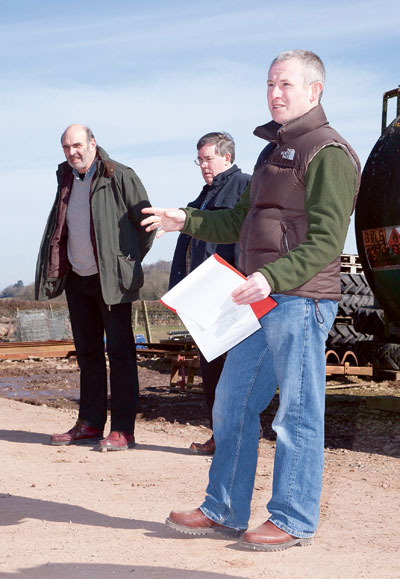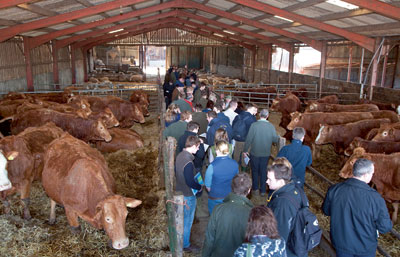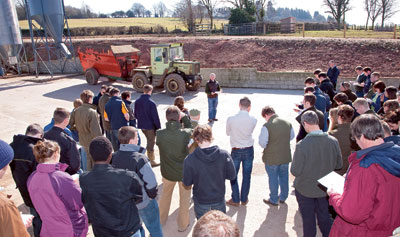Newcastle students triumph in Farmplanner 2010 competition
Farmplanner of the Year, now in its 16th year, tests agricultural students’ abilities to think creatively and strategically in the context of the commercial reality of a modern farming business. And this year, the challenge was no less daunting, as seven teams were let loose on a complex, multi-enterprise operation on the Gloucestershire-Herefordshire border.
Student teams were set the task of carrying out a complete business review at Bradley Farm, run by Charlie Whitehouse and his father Philip. The Whitehouse family is celebrating its centenary at Bradley Farm this year.
The business occupies 840ha (2075 acres), largely rented from 15 different landlords. The key enterprise is a 1000-head dairy goat herd, housed all year round, which Charlie Whitehouse describes “factory farming with the ‘Ah’ factor”, and sure enough all the students who’d never seen a dairy goat business were suitably impressed.
The goat herd shares the farm with a large sheep operation, with pedigree Charollais and Lleyn flocks plus cross-bred commercial ewes. These have produced a stamp of lamb that Philip Whitehouse is particularly proud of and supplies the Mayhill Lamb Producers Group. There are also 1600 store lambs finished off forage crops and herbage seed leys.
Cropping is split between a large area of wheat, barley, winter oats, oilseed rape, winter beans and herbage leys, all grown for seed. Other ground is in oilseed rape and permanent pasture. About 32 acres are given over to potatoes each year.
The farm also includes a 45-head Limousin-cross South Devon suckler herd, which makes use of some older buildings during the winter and mops up surplus forage from the goat herd.
“It was very useful to take stock of the business in preparation for the day and the subsequent questioning by the students,” says Charlie Whitehouse. “I genuinely found it very refreshing to open my doors to the teams. If we want good people to come into the industry we have to help them and give them some good experiences.”
Mr Whitehouse set the student teams to work on five key questions:
- How could Bradley Farm make its produce more attractive to buyers?
- What did the business have to gain by taking part in some form of co-operative venture?
- How could the partners improve the carbon footprint of the business?
- What strategic options for the future did the business have?
- What one area of Bradley Farm’s operations could be significantly improved, with a business case to support this change?
“Because this is a diverse and complex farming business, every single action will have knock-on effects elsewhere – often quite significantly – and I wanted to get this point across to all the teams,” says Mr Whitehouse.
Tim Brigstocke, who organises the competition for the Institute of Agricultural Management, says the success of the competition for students depends on the quality of the case study. “Farmplanner is now in its 17th year and is open to all universities and colleges that teach farm management. Ideally, we like to present the student groups with a substantial farming business or rural estate with more than one enterprise. Working with us, the owner or manager sets the students a series of questions he wants to see answered.
“The farm visit usually takes one day, so all the teams get the chance to thoroughly explore the enterprise, and then have the opportunity to interview the host as individual teams.”
Student groups submit their reports to the judges, which include the host and representatives from the sponsors and IAGRM, who then select a shortlist of three or four teams to move on to the next stage.
The students must then pitch their conclusions and recommendations to the host farmer and judges as professional consultants, before the winning team is chosen.
“The farmers involved have found the experience really useful and many of the ideas suggested by students have been put in place on previous host farms,” says Mr Brigstocke.
Teams from further and higher education colleges compete equally and it’s by no means the undergraduate students who most often win, he says.
“Generally, smaller teams get the most out of the experience. And the standard this year was very high. Because Charlie and Philip Whitehouse’s business is so diverse and complex, the students’ options were really quite limited – it was clear that any significant changes to the business they recommended had to be a process of gradual change rather than revolution.”
The winning team of Newcastle University students, Philip Dunn and James Hamilton, presented a convincing business case to expand the farm’s suckler herd and, rather than finishing all progeny, to take advantage of strong cattle prices and sell them as stores.
“Philip and James’ presentation was well thought-through and practical,” says Mr Brigstocke. “They’d taken into account the objectives of the family and how they wanted to farm, but most of all, their recommendations made a clear difference to the bottom line,” says Mr Brigstocke.
“I had a feeling that students’ attention would gravitate towards the suckler herd,” says Charlie Whitehouse. “But I didn’t want them to just take the easy option of doing away with the cows.
“Philip and James picked up on my question about co-ops too. They could see the benefits from being involved in the Mayhill Lamb group and suggested we explore a similar venture for our beef.
“It was a difficult job to choose the winning team as it was a very tight competition. But if I was looking to employ a team as business consultants, Philip and James from Newcastle had the edge.”



Runners-up: Judges’ Comments
Harper Adams
“Harper students had a good, production-based set of ideas, including introducing a Stabiliser cow to improve the suckler herd, and exploring the benefits that EID could bring to our sheep flock. A good, muddy-boots approach”
Reading University
“The most blue-sky thinking from all the teams and very thorough – the only team to consider the management structure of the business and whether we need an assistant farm manager.”
Charlie Whitehouse, host farmer.
What’s it all about?
The Farm Planner of the Year competition, organised by the Institute of Agricultural Management and supported by Farmplan and Farmers Weekly.
Who is it aimed at?
Student teams at agricultural colleges and universities throughout the UK. Lecturers and course managers field teams of students from a range of further- and higher-education courses, who will benefit from the chance to get their teeth into practical farm management topics.
Who took part this year?
This year’s challenge saw teams from:
- Harper Adams University College
- University of Reading
- University of Newcastle (Winners)
- Royal Agricultural College, Cirencester
- Plumpton College, East Sussex
- Kingston Maurward College, Dorset
- Myerscough College, Lancashire
Where is it held?
The success of the competition hinges on its host farm. Typically, large mixed farms and estates generously give students the opportunity to completely review their business structure, objectives and performance, with access to farm management data including financial information. All information is treated confidentially, but the greater the level of access hosts give the students, the better the exercise and, very often, the more useful the results.
If you feel you can give students the chance to test their mettle on your farm business, please contact IAGRM director Richard Cooksley on 01275 843825 or enquiries@iagrm.org.uk
When does the competition take place?
Usually, the on-farm work (one day) takes place in early spring, with the shortlisted teams presenting their appraisals to the hosts and the judges in early July.
Where can I find out more?
Visit the Institute of Agricultural Management website www.iagrm.org.uk
